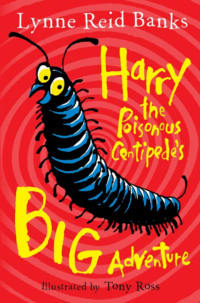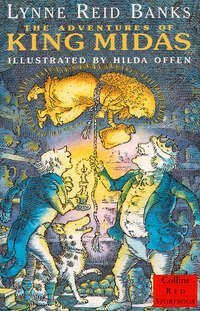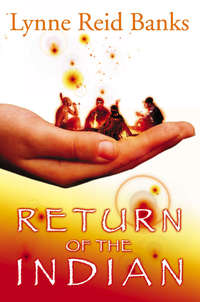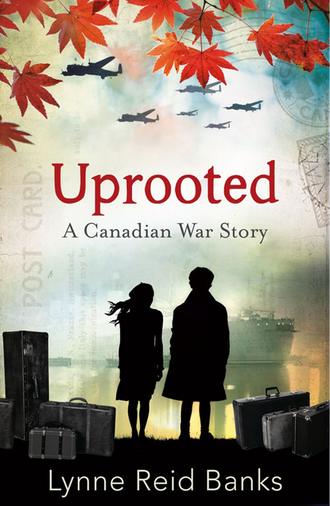
Полная версия
Uprooted - A Canadian War Story


Of course, we’d been told about where we were going, but I must say it didn’t mean a lot, at least not to me. Cameron, who was a brain-box, probably did a bit of research, which may have been part of why he didn’t want to go.
Great-uncle Arthur O’Flaherty lived in a place with a very funny name – Saskatoon, Saskatchewan, which was somewhere called the prairies in the middle of Canada. On the boat, whenever we’d told people where we were going, they either looked blank or said, “That’s pretty far west.” This made me feel we were going into some strange lonely place far from civilisation.
I knew that our uncle was quite old, and lived alone in a small flat, on a pension, so he couldn’t have us to live with him. So when my family wrote to him to ask his help, he’d found a middle-aged couple called Gordon and Luti Laine, who offered to receive us as ‘war guests’. Mummy had told me that Canadians are usually very polite and nobody wanted to hurt our feelings by calling us evacuees so ‘war guests’ was what people like us were called.
Great-uncle Arthur turned out to be one of the kindest, gentlest, most generous men in the world. Good all the way through. But the trouble with really, thoroughly good people is, they often can’t seem to realise that not everyone is as good as themselves.
We docked at Montreal in the evening. As we sailed into the harbour, we could see a tall, pointed hill with a cross on the top, all lit up; it was our first glimpse of the city.
Mummy sat on a bollard at the docks, after we collected all our big luggage. She took her wallet out of her handbag – which never left her – and counted our money. She’d changed it from pounds to Canadian dollars on the ship, and it looked a lot more – she got five dollars for every pound. But we’d spent a lot on the ship.
Daddy had had a talk to me before we left. He usually left serious talks to Mummy, but this time it was about her, so he did it.
“We’re not a rich family,” he said, “but you’ve never gone short. Now, when you and Mummy are in Canada, she won’t have any money of her own.”
“Why not? Can’t you send us some?”
“No. Wars are so expensive. The government wants women and children to go abroad to be safe, but still they don’t want money to go out of the country. They’re not going to let me give you more than ten pounds apiece. With Cameron’s ten pounds, that’s thirty altogether. Not very much. Just about enough, if you’re careful, to get to where you’re going. After that, you’ll have to depend on other people. Strangers.
“And that’s going to be very hard on Mummy,” Daddy went on. “Having to ask every time she wants something. Please, Lindy, be a very good girl and try to understand and not ask for too much. You’re not greedy, I know that. But it will be hard on you too.”
Mummy counted out the money we had left and took us to the hotel nearest to the docks for the night. It was pretty scruffy, but Mummy said, “Our train for the prairies leaves early in the morning. We have to sleep somewhere, and this place at least is cheap.”
Cameron and I were hungry. We left our small mountain of suitcases in our three-bed room and went out into the shining, thronging streets of the city.
There were lights everywhere. England had been blacked out for months and months before we left, and it’s hard to describe how wonderful it was to see all these lights blazing – street lamps, office blocks with all their windows lit up, colourful advertisements, car headlights … The whole city was like a Christmas tree. Even Cameron, who, I knew, was determined not to like anything in Canada, couldn’t help twisting his head in all directions, drinking in all those lovely lights.
Another thing that was different from England was that the streets were full of people. In London people didn’t go out at night much because without lights it was so dark you could fall over things. Here, there were crowds, all with loud voices – mostly French ones, which astonished me – and lit-up, cheerful faces. Nothing could have showed more clearly that we’d left the war behind. No one here was afraid of Hitler’s armies or his bombs.
The man at the hotel desk had told us about a restaurant a short walk away. We headed there, through the bright night, not talking because it was all so strange and we were suddenly very tired. Mummy held our hands. We were still wearing our ship clothes, which were rather crumpled and grubby after five days at sea, but Mummy had dug out a mac for each of us to cover up the worst.
We reached the restaurant and stepped inside. There was an orchestra playing. The place was crowded with lively people eating their dinners, all talking and laughing and clinking their knives and forks. But as they noticed us standing in the doorway, a silence spread out across the room.
Then the orchestra stopped what it was playing, and struck up ‘There’ll Always Be an England’.
Everyone stopped eating. Some people started singing the song. Several men began to stand up, and then sat down again. Every eye in the restaurant was fixed on us. It was as if we were standing in a spotlight.
They obviously saw that we were fresh off the boat from England. ‘There’ll Always Be an England’ was the pop song of the moment and they played it for us. I thought they were being nice, but for Mummy, it was a horrible ordeal. She felt stared-at, exposed, humiliated – the poor refugee from war-torn London, an object of pity. She stood it for the whole length of the song, as if she was being punished somehow, and then she took our hands again and turned and fled.
I don’t remember where or what we ate that night. Our first hamburger, probably, or our first hot dog. All I remember was seeing Mummy crying her eyes out for the first time since we left England.
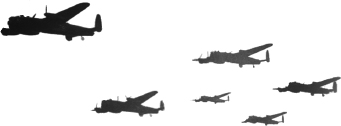

The next morning we got up early and took two taxis to the railway station with us and all our luggage. Mummy didn’t want to spend money for taxis – she kept watching the meter – but there was no other way.
She told us that the train journey to Saskatoon would take three days. This gave us an idea of how big Canada was – the longest train trip I’d ever taken was three hours, to Newcastle-upon-Tyne to visit my old nanny.
“Your fathers paid for our tickets before we left England,” Mummy explained. “So we shouldn’t have to spend any money till we get there. The ship was expensive – luckily there’s not much to buy on a train!”
In the taxi I asked, “What will the Laines be like?”
“I think, very nice. We got a letter from them saying how much they’re looking forward to having children in their home.”
“Haven’t they got any?”
“No.”
Cameron frowned, and said, “I suppose we’ll have to be very quiet and well-mannered then.”
“Yes, you will,” said Mummy. “And who knows for how long? It’s not like a visit. We’ll be living there. It’ll be their house and we’ll have to stick to their rules, whatever they are.”
“Sounds like lots of fun,” muttered Cameron.
We settled on to the train, as we had on the ship, but of course with far, far less space. We had two double seats, facing, with a folding table, to ourselves. Most of our luggage was taken away to be put in the luggage van. We just had the suitcases we’d had in the cabin.
“Won’t I be glad when we can have proper baths and I can get all our clothes washed!” Mummy said.
Mummy was the cleanest person in the world and it was hard for her to put the same clothes on day after day. She’d washed our undies and socks out every night on the ship, but on the train she couldn’t.
And the train wasn’t very clean, I must say. It was a steam train, which meant a lot of smoke blowing back from the engine. Even though the windows didn’t open, everything soon felt gritty.
The locomotive let out a long hiss and sounded its whistle. As soon as it began to move, Cameron and I jumped up and started to explore.
We could run up and down the aisle between the seats, although Mummy said we should walk, and not disturb other passengers. There were a lot of children besides us on the train with their families, but I don’t think any of them were evacuees – they looked too clean and tidy. I somehow knew we wouldn’t make friends with any of them. We were set apart.
We went as far towards the engine as we could go, and then the other way, towards the last coach. We passed through a dining car where the stewards were laying the tables for lunch, which cheered us up. Beyond that, past the kitchen coach with its white-coated chefs and lovely smells and another three carriages, we found it – our happy heaven! It was called the Observation Car.
First there was a carriage with a bar in it. People were sitting around with drinks and snacks and newspapers. We sort of sneaked past them, because we could see that at the far end – the very back of the train – there was an open place. When we got out there, we stood on the rocking, swaying, racketty boards, and stared around us in amazement. It was just like the back of a small ship! A half-moon space with a curved rail around it and a roof over it, but open sides. We could hear the clacketty-clack of the wheels racing over the rails, smell the smoke from the engine far away at the front of the train, and breathe the Canadian air. How different from English air, somehow!
“You could easily just fall off the back of the train,” I said, leaning over, staring at the rails streaming out behind us.
“Only if you were extremely stupid,” said Cameron, backing up his point with, “‘Better drowned than duffers. If not duffers, won’t drown.’” This was from Swallows and Amazons, which, before he found England, Their England, had been one of his favourite books.
There was nobody out there but us. We sat on the fixed seats and watched the outer suburbs of Montreal flash past, and then the countryside – wide, lots of lakes and trees, empty of people – everything utterly new and exciting. But also scary – it looked so wild. I could feel my heart beating in time to the wheels: Clicketty-clack! Clicketty-clack! You’re going so far you may never go back!
“Aren’t you liking any of it?” I asked Cameron at last.
“No. Yes. I don’t know,” Cameron said, scowling out at the wild scenery. “I wonder if there’s hunting here.”
After a while, Mummy came to find us.
“Isn’t it big,” she said.
I could tell she liked the wide open spaces. Nothing claustrophobic about this.
She sat with us for a while and smoked a cigarette. Her smoke streamed away with the rest of the smoke. Mummy smoked an awful lot – she always had, but she’d cut down since we left home, to save money.
At last Cameron said, “Isn’t it nearly time for lunch?”
We worked our way back to the dining car and sat down at a table nicely laid with clean linen and cutlery and glasses. After the ship, the rocking of the train merely jingled the glasses against the knives and forks.
We were just looking at the menu, which was full of strange but interesting things, when the waiter came along and asked Mummy for our tickets.
She brought them out of her handbag and gave them to him. He looked at them for a long time and I felt a sudden prickle of unease. Something was wrong.
“I am very sorry, ma’am,” he said. “These tickets only entitle you to ride the train to Saskatoon. They don’t give you any meals.”
Mummy looked at him in disbelief.
“No meals?” she said. “But my husband bought us first-class tickets from Canadian Pacific Railways in London!”
“These are standard-class tickets, ma’am. They don’t include meals.”
“So what are we to do?” Mummy asked with a shrill note in her voice.
“There’s a snack bar in the observation car,” he said, looking very uncomfortable. “You can get sandwiches, peanuts, candy bars, that sort of thing. And soft drinks. And tea,” he added, as if that made up for everything.
“For three days?” Mummy cried.
People were looking at us now, and I became aware of how we must look – travel-worn and shabby. I was suddenly so hungry I felt tears come into my eyes. I looked at Cameron. He was just laying the menu down in a very final kind of way, as if he were saying, Well, this is just what I was expecting. Complete disaster.
“Of course,” said the waiter, “if you care to pay a supplement on your tickets, to make them first class—”
Mummy stood up, and urged us to our feet.
“I can’t,” she said, as quietly as she could. “We left England with ten pounds each, of which I have less than half left. Let’s just hope Canadian Pacific Railways does very cheap sandwiches.”
She herded us into the aisle and back towards our seats, under the eyes of everybody in the dining car.
“Mummy, what happened? Didn’t Daddy buy the right tickets?” I asked.
“I don’t know,” Mummy said. “I’m sure he meant to. There’s been a mistake, that’s all.”
“So now we live on sandwiches and ‘candy bars’ for three whole days,” said Cameron. “What’s a ‘candy bar’ anyway? Is it like Brighton rock? I hate Brighton rock!”
“We’ll soon find out,” Mummy said grimly.
We went back to the observation car and Mummy bought us a ham sandwich each, and lemonade. The sandwich had mustard in it, but for once I was good and didn’t grumble. I could see Mummy was in an awful state about the tickets – she hardly ate anything. I had to make her take bites from my sandwich. She told me smoking means you don’t have much appetite but I didn’t really believe her.
Candy bars turned out to be scrumptious, though. We got one each. Mummy said, “I’m sorry, darlings.” We looked at the shelves behind the bar. They were laden with delicious food – no rationing here! But now we had money rationing.
Cameron, for once, couldn’t hold back. “Could we have some peanuts, Auntie? They can’t cost much,” he said.
“Oh, why not!” said Mummy. She bought us a bag to share, and lit another cigarette.
We went back to our seats and Cameron and I played hangman for a while. Suddenly a man came and sat on the spare seat next to Cameron. He was tall and a bit grey-haired with a tanned face.
“Excuse me,” he said. “May I talk to you?”
Mummy, who’d been powdering her nose with her little swansdown puff, snapped her compact shut and said, “Yes?” rather too sharply for good manners.
“I couldn’t help hearing about your trouble – I was at the next table,” he said.
I felt Mummy stiffen. I didn’t know what was coming, but she did, and she was going to hate it.
“You’re from the Old Country,” he said.
I would soon learn that a lot of Canadians call England ‘the Old Country’. “Well, I’ve got folks there. I’m very worried about them, with all this talk of invasion and all. I want to help them, and I can’t. So I thought, maybe I could help you instead.”
Mummy just sat there. Nobody spoke. Cameron and I stopped playing our game to listen. We needed some help. Was Mummy going to say no? I knew she wanted to. She was very proud. I remembered Daddy’s talk.
“I couldn’t take money from you,” she said. “It’s kind of you. I just couldn’t.”
“No? Well, could you allow me to invite you and the kids to dine with me in the dining car this evening?”
Mummy bent her head. Then she lifted it again and looked this kind man in the face.
“Yes,” she said in a strangled voice. “I could. Thank you.”
“Thank you,” he said. “I think we should eat early, don’t you? So the kids can get an early night. They begin making the berths up at around seven, and the first sitting for dinner is at seven too. They ring a bell. I’ll come by for you.”
He stood up to leave. “My name’s Hank, by the way.”
“Mine happens to be Mrs Hanks,” said Mummy. She couldn’t help smiling.
Cameron and I looked at each other. We pulled gleeful faces.
Hank paid for our meals from then on – two and sometimes three a day. Mummy tried to cut down on meals, and for herself I think she’d rather have starved, but she couldn’t starve us or keep us on sandwiches (and lemonade called Seven-Up) for three long days. Even with the odd peanut.
By the time we got back from the dining car that first night, the night conductors had miraculously transformed the seats into beds. Each person had either an upper or a lower berth. To climb into the upper berths there was a ladder. Of course Cameron and I both wanted an upper berth but only he got one. I was in a lower berth and so was Mummy.
Once you were in your berth, you could draw thick green curtains across and fasten them together from the inside, so you were in your own little room. On the first night I thought this was the best thing in the whole train.
But for Mummy it was a nightmare. Her claustrophobia kicked in.
“I don’t know how I can stand this,” she said to me in a tight, desperate voice. Then she was ashamed of worrying me, and said, “Never mind, darling. I’ll manage somehow.”
I got undressed in my berth. I loved being in it. I realised it was better to have a lower berth because I had a window. I could open the blind and watch the dark scenery going by. The rocking of the train and the rumble of the wheels soon put me to sleep.
When I woke up in the middle of the night, I climbed out into the empty, half-lit aisle, and looked into Mummy’s berth. She wasn’t there! Where could she be? She’d said “I’ll manage”, but how could she? She couldn’t even sit up all night in her seat because our seats weren’t there any more – they’d been turned into berths.
I pattered down the aisle in my bare feet. By instinct I headed towards the back of the train. Everyone was asleep behind their curtains. I opened the doors between the coaches and skipped through the swaying, accordion-y connectors, holding tight to the rail.
Suddenly I felt the train slowing down and when I was just in the middle of one of these tricky in-between bits, it stopped altogether. Not sharply enough to wake anyone; it just came to a standstill, with a lot of hissing.
I hurried on to the last coach – the observation coach. This would be where Mummy would head for – where she could sit outside and not feel shut in. I was absolutely sure of it.
A few men were there, having a late-night drink at the bar. Not bothering about them seeing me in my nightie I ran past them, through the carriage to the open bit at the back. I knew Mummy would be there – I just knew it. But I was wrong.
I stood on the platform, staring round. We’d stopped, not in the middle of all that emptiness as I’d thought, but in a little town. All the buildings were low and apart from a few lonely street lamps, it was almost as dark as London. There was just a wooden platform with a sign and a name that I couldn’t read. The train stood, hissing and kind of chuntering – an impatient noise. A noise that said, I’m not staying here long.
I stood there, clutching the rail, staring into the dimness. A man came on to the platform behind me.
“Are you looking for your mom?” he said.
It was the first time I’d heard that word. But I nodded.
“She was here. And she didn’t come back through the bar. She must’ve got off the train.”
Got off the train? That was impossible. The train would soon leave. Had she – no! But if not? – run away?
I wanted to shout for her. Mummy! Mummy! Come back! But the man was there and I couldn’t. I couldn’t let him think I had thought for one split second that she would leave us.
“Are you cold?” the man asked.
It was very warm, for night-time, but I was shivering.
He took off his jacket and wrapped it round me. “Tell you what. You sit out here and I’ll bring you a Coke while you wait for her.”
The ‘Coke’ tasted not of coal as I expected, but of mouthwash. I hated it. I clutched the bottle tightly, because just standing there thinking the train was going to start forward, leaving her behind, was unbearable. I stared out into the half-lit station and my whole inside clenched up. I was barely breathing. The man sat on one of the seats.
“Coke OK?”
I forced myself to nod, my eyes straining in the darkness.
“Where you folks headed?”
“Saskatoon.”
“That’s mighty far west. You got family there?”
“Mummy’s—” My voice stopped coming out.
“You from the Old Country?”
I tried to swallow. There was no spit. I took a sip of the sickly sweet stuff from the bumpy bottle to moisten my mouth. “Yes.”
“I guess they’re being pretty brave over there,” he said. “And you folks are brave, too, coming to a strange country. Where’s your pop?”
“My – what?”
“Your dad.”
“He couldn’t come.”
“He’s in the forces?”
“No. He’s too old. He’s a doctor.”
“So your mom’s doing this on her own.” He shook his head. “She’s one brave lady.” He stood up suddenly. “And here she comes.”
I looked where he was looking – at the end of the platform. It was true! She came out of the darkness at the far end, into the light. There was a man with her, one of the conductors. I recognised him.
When Mummy saw me leaning out over the rail, she broke into a run. In another minute I was in her arms. I hugged her as if I’d never let go.
“Lindy – my darling – what are you doing up?”
The conductor was waving a flag. The train hissed once more and started to move. Both the men disappeared. It was just me and Mummy on the swaying back of the train, with the breeze blowing as we picked up speed.
“Mummy – Mummy – where were you? I thought you’d run away!”
“Oh, my God, you didn’t!” she said.
She sat down and took me on her knee. I’d never loved her so much, or had such a feeling of relief.
“I was sitting out here,” she said. “I’d run out of cigarettes. I’m afraid I was crying. I felt so lonely and scared. And that very sweet man came out and sat with me and I told him – about Daddy and how I didn’t know what we were going to find in Saskatoon – and when the train stopped at that little town, to take on water, he took me for a cup of tea to the tiniest café you ever saw … It was all made of logs … He even bought me some cigarettes – look, they’re called Black Cat! I knew the train couldn’t leave without him. I never dreamed … Oh, my poor little poppet, you must have been so frightened!”
She slept the rest of the night in my berth, tops to tails, with the blind up on the window so the moon could shine in.
Hank was travelling alone, and at meals we talked. He lived in Calgary, which was even further west than we were going. We asked him what it would be like, in Saskatoon.
“When you get to your host’s house,” he told us, “the first thing he’ll ask you is, ‘Do you ride horseback?’”
“Well, we do,” said Cameron eagerly.
“Y’see, out west, the folks want to keep some of the old pioneering ways. They don’t want to get soft and citified, even if they’re not ranchers and trappers any more. So, they eat regular meals, like those spoilt easterners, except for one, and that’s breakfast. For breakfast they keep up the old traditions.”
“What do you mean?”
“I mean, they go out and catch their own breakfasts.”
Cameron’s mouth fell open.
“You mean, they go hunting, on horseback?”
“Sure do. Can you shoot?”
“No.”


